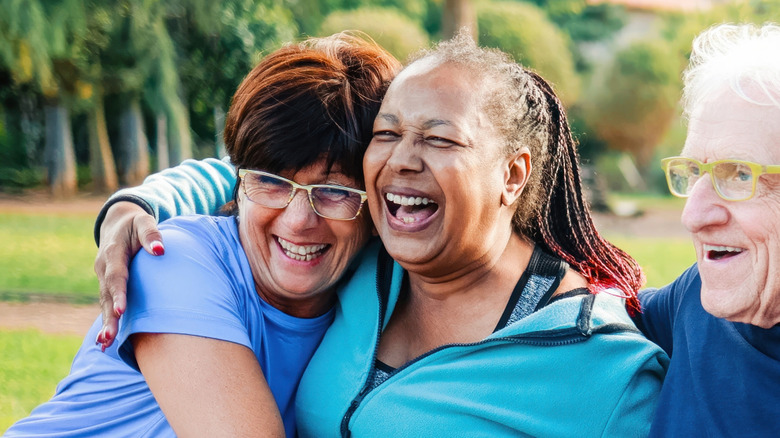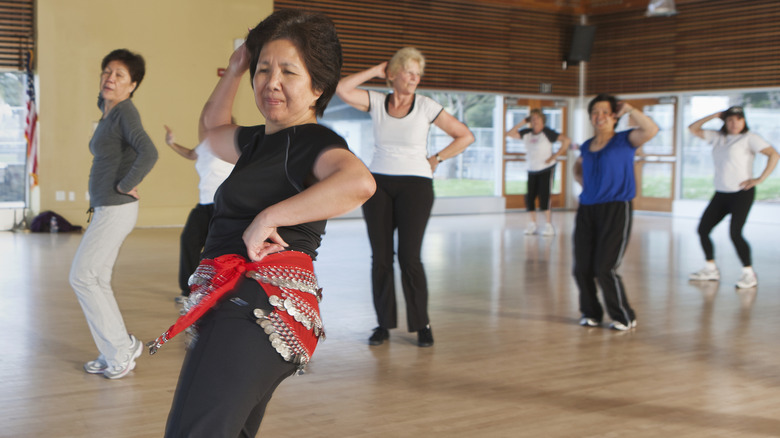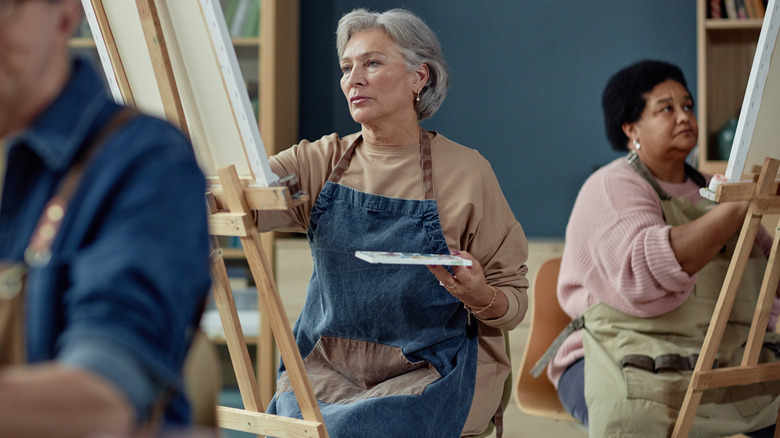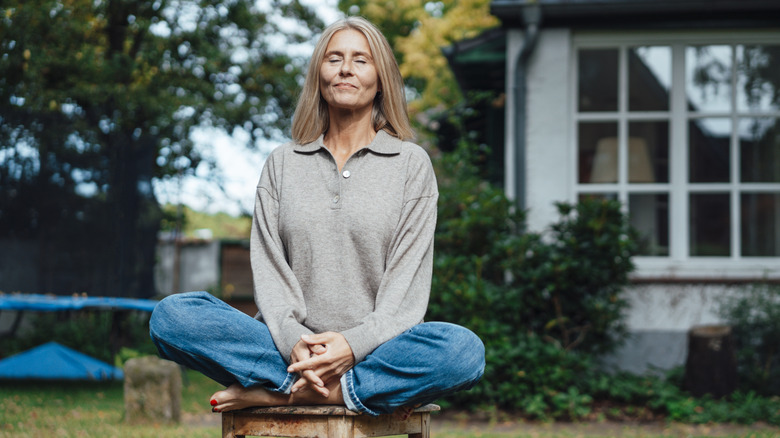5 Habits To Start In Your 60s For A Happy & Healthy Life
With the average American living to around 80 years of age, it's safe to say that your 60s are far from ancient. Granted, you're no longer a spring chicken, like someone in their 20s, but that doesn't mean there aren't plenty more things to experience. It's just a matter of putting yourself out there and getting busy living.
That said, if you want to stay healthy and happy through your 60s and into your 70s and 80s, it requires more effort than it did in your younger years. For some people, that means transforming your relationship with exercise so that you're keeping your physical body moving. For others, it may mean letting go of the fear around risks. If you haven't been doing these things and you're in your 60s, then it's time to put better habits into motion so you can make the most of your latter decades. Even if you don't have any major interest in reaching the ripe old age of 101, you might as well enjoy the ride while you're here. To do so, means living a happy and healthy life that's full of joy, as opposed to just sitting around, collecting dust, and merely existing.
Keep trying new things
You're never too old to try something new. Whether it means finally summoning the courage to do something you've always wanted to do but feared in your youth, like bungee jumping or sky diving, or learning to do something you only dreamed about doing, like getting your pilot's license. Your age isn't a roadblock to expanding your experiences, so don't let the birthdate on your ID ever stand in your way.
"Trying new things, even when you are nearing or at retirement age, is important for your overall well-being," psychologist Dr. Alexandra Stratyner exclusively tells Women. "It helps keep your mind sharp and encourages the development of new connections in the brain (also known as neuroplasticity), which can protect against memory loss and cognitive decline." As Stratyner explains, when you try something new, it not only gives you a sense of accomplishment, but can prevent you from getting bored. If the something new you're engaging in includes moving your body, then even better. "New challenges make us confident and resilient, making managing life's shifts easier," says Dr. Stratyner. "Experimenting can make you feel excited and happy, increasing your mood and well-being." Staying active helps contribute to keeping your mind sharp.
Socialize and surround yourself with others often
According to a 2020 study published in BMC Public Health, it's estimated that nearly half of all individuals 60 and older are at risk of experiencing isolation, while 33% of those in the same age group will find themselves battling loneliness. Extended periods of loneliness can lead to depression, as well as other mental and physical health issues.
"Social isolation can be a significant risk factor for mental and emotional decline in older adults," says Dr. Alexandra Stratyner. "To counteract this, make it a habit to engage in social activities, whether just a weekly coffee with a friend, a phone call with family, or attending a community group or class." Dr. Stratyner suggests finding a hobby that you can do with a friend or family member because it keeps you reliable, you have a standing appointment, so you're more likely to show up. "Being accountable to someone else often provides an external push to move forward and can reduce the feeling of isolation that can accompany trying something new later in life," says Dr. Stratyner. If no one is around, even just getting out and doing errands can be beneficial, because you're moving and interacting with others.
Granted, there's nothing wrong with enjoying your alone time, but having a network of people to count on and things to do with them is the key to staving off isolation. As you get older, you might start to feel drawn to laying low, but you need to fight those feelings. As long as you're alive, you've got a lot of living to do.
Celebrate the small victories
As much as no one like to admit to it, what you were capable of in your 20s or 30s just isn't the same once you're in you 60s. However, that doesn't mean that the things you enjoyed in the past, need to stay there. If you were once proficient in yoga or ballet, you can make those things a part of your present day life. You just need to get over the negative voices in your head that are suggesting those days are over, because guess what? They're not.
"One of the most effective ways to overcome mental roadblocks is to break the goal into smaller, manageable steps," says Dr. Alexandra Stratyner. "Instead of thinking, 'I'm going to start painting again,' which might feel overwhelming, you could start with a 10-minute sketch or paint a small canvas over a few weeks." Dr. Stratyner suggests taking this approach to whatever it is you want to do. "If you're considering therapy, you don't have to dive into deep emotional work right away — just scheduling a first appointment and deciding to go can be a significant step," says Dr. Stratyner. "Small victories create momentum and often lessen the emotional load." In time, you'll get to where you want to be, even if it's not exactly where you were at 25. Part of getting older is confronting age with confidence and not trying to fight it, so don't waste your energy on the latter.
Learn to let go of what you can't change
When you've been around long enough, you're likely to have met at least a handful of people you can't stand and probably found yourself in situations that, even now years later, make your blood boil. While this is completely normal and natural, because not everyone is someone else's cup of tea, if you've been living with grudges, no matter how few there might be, in your 60s it's time to start the habit of shaking resentment from your bones.
A 2021 study published in Qualitative Psychology found that when we hold grudges, in the long run, our quality of life suffers. According to the American Behavioral Clinic, holding on to what you can't change and letting it eat at you can increase blood pressure and stress levels, which can lead to heart problems. Hanging on to grudges can also impair the immune system and contribute to cognitive decline. Because all of these things older bodies are already more prone to, if you can take a deep breath and let go of the people and situations that you don't have the power to change, then you'll be better off — mentally and physically — for it.
Stay active and sleep well
When it comes to enhancing your quality of life and improving your well-being, a great way to do that is by staying active. This doesn't mean that now that you're in your 60s you should pick up marathon running, but it does mean that you should make more of an effort to move your body. Something as simple as a daily walk can do wonders for your health. "Exercise is not only vital for physical health but also crucial for mental and emotional well-being," says Dr. Alexandra Stratyner. "Whether it's a walk in the park, yoga, swimming, or strength training, find an activity you enjoy."
According to a 2023 study published in Cureus, physical activity improves how the hypothalamus-pituitary-adrenal axis functions, meaning it keeps stress hormones in balance, helping to minimize anxiety and depression. Staying physically active also plays a role in how well you sleep — another important habit to start in your 60s (if you haven't already). "Adequate rest helps to restore energy, improve emotional regulation, and reduce the negative impact of stress," says Dr. Stratyner.
Living a long life is a privilege and not one that should be taken for granted. If you make it to your 60, consider yourself lucky and embrace the habits that are going to make the rest of your life one heck of a fun and interesting adventure.





